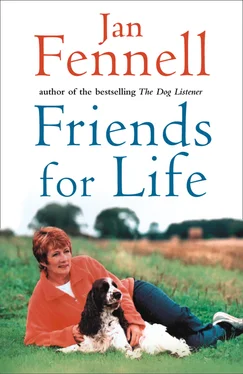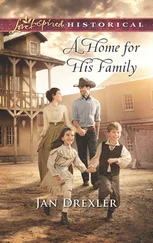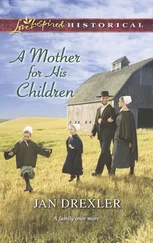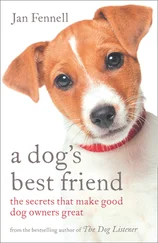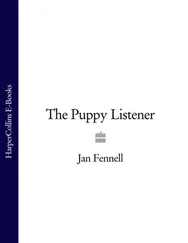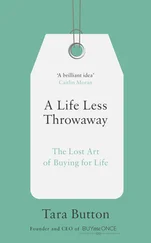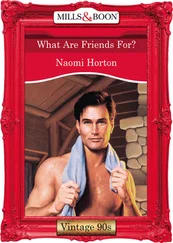We got back into the lorry and drove home. I was nervous as well as excited. The poor little puppy was traumatized at having been separated from his litter. No matter how much I cuddled him he cried all the way home. Dad understood this better than I did. ‘He’s frightened. He’s got to learn to trust us,’ he said.
When we got him home he ran around the flat like a dervish then peed on the floor. My dad and I looked at each other with horror. We were both thinking the same thing. Mum.
‘Perhaps we should have put him out in the garden,’ I said as I went to get the cleaning materials.
For once, however, Mum confounded us.
When she came home from work that evening she didn’t worry about the fading patch of damp on the carpet. Instead she seemed genuinely interested in the new arrival. ‘Hello, you’re nice,’ she said to the puppy.
Her interest didn’t extend to being affectionate to the dog, however. He started climbing up and she stepped back. ‘Don’t jump up at me, dear,’ she told him firmly. She then ignored him for the rest of the evening.
Shane, as I had soon christened him, brought me and my father closer than we’d been for a long time. Dad loved him too and training him became our joint project.
Dad sorted out his vaccinations. Then we did obedience training in the traditional way. He was very concerned that we should be responsible about it all. ‘We want him to be a well-trained dog, a happy dog,’ he would say to me. And in that respect, we succeeded brilliantly.
Soon we had taught him to walk to heel and to come. And soon both Dad and I were taking him out for walks around the neighbourhood. Dad also used to take him out in the lorry during the daytime. He became a member of the family in a way no other pet had, apart from Bluey.
Mum treated him like another child. She wasn’t nasty to him; she thought he was cute, although she never warmed to him. She fed him and let him out into the back garden. But her main concern was that he always wiped his feet and didn’t get things dirty and kept the house clean. We had to groom him too so that there were no hairs anywhere.
In effect she behaved towards Shane as she had towards me – to such an extent that she wouldn’t let him go out on the street with the other dogs from the neighbourhood.
Mum disapproved of me mixing with the rest of the kids from the street. If I was sitting out on the coping she would appear at the top of the stairs: ‘Janice, come in here, don’t do that, that’s what common people do.’ She was a snob. She couldn’t see that we were ‘common’ too.
Shane was soon being treated the same way. She said once she didn’t want him being a street urchin. She didn’t want him mixing with a lower class of dog!
Mum was too wrapped up in her own life to keep a constant eye on us, however. And soon Shane was very much integrated with the other dogs on the street.
The leader of the local ‘pack’ was Bobby, an old mongrel, a foxy type of dog with pointed ears. Bobby was the street’s guard dog. When Shane first arrived as a puppy, Bobby was very protective of him whenever I took him out. We used to giggle because if any other dogs came near Bobby would adopt a stance, growling and staring aggressively. He was fourteen years old, slow and frail looking. But it was a convincing act nevertheless.
As Shane grew, however, old Bobby was relieved of the duty. The passing of the torch came one day when Shane was about nine months old and a big black dog appeared around the corner. Bobby growled at him as usual but it had no effect. For a moment it looked as if there was going to be trouble, but it was Shane who drove him away. Afterwards Bobby licked Shane’s face, as if thanking him for what he’d done. From then on Bobby and Shane became a duo.
Like Digger, Shane opened doors for me. In many ways he allowed me to become a part of the community for the first time. I became friendly with the children who owned Bobby and another dog, Lucky. We’d all jump on a bus up to Putney Heath together where we’d let the dogs run free at the weekends.
My mother disapproved of this, of course, but less because of the friends I was making than because of the mess Shane used to come back in. I recall one Sunday lunchtime when we went to Putney Heath but got caught out by a wet mist that came down. The ground became very heavy and the dogs got clatted up. We were lucky to be allowed back on the bus to Fulham.
The dogs were sweating heavily, too, and the smell they gave off was terrible. We went upstairs, giggling whenever a passenger clambered up the steps only to return to the lower deck when they were hit by the stench.
As we drew closer to home, however, the laughter faded. My mother was having friends around for tea. I thought to myself: ‘She’s going to kill me.’
I tried to sneak Shane in so that I could give him a bath straight away. My mother wasn’t there but my father was. He loved Shane and helped me get him in the bath. We were having great fun and games cleaning him when my mother reappeared.
I remember she turned absolutely white with rage. The fact that Dad was laughing only made things worse.
The respect for animals I had inherited from my grandmother and Great-Uncle Jim deepened as I grew older. But it also brought me into conflict with other members of the family who had a different outlook.
At first my sensitivity to the feelings of other living creatures showed itself in small ways. My dad liked cowboys and he used to take me to see westerns. I would get upset when the horses were brought down. I didn’t know it at the time, but they were using potholes or tripwires. To me there was nothing clever about killing animals. My nan and my Great-Uncle Jim had taught me to respect and care for horses and such activities went against this principle.
And by an early age I had begun to rebel against the idea of eating animals. I can vividly remember that when my mother used to take me to Manzi’s eel and pie shop, I would watch the wriggling eels and think, ‘There is no way on earth I am going to eat them.’ But when I voiced my feelings she didn’t like it.
On one occasion at the butcher’s my mother asked for veal. I asked what it was and was so horrified when they explained how it was produced that I blurted out the words, ‘I’m not eating that.’
‘You’ll eat it and like it, my girl,’ my mother snapped.
‘Sounds like you’ve got a revolution on your hands,’ the butcher smiled as she dragged me out of the shop.
That night at home I sat at the table, the veal on my plate in front of me, locked in a war of wills with my parents. I knew if I put it into my mouth I would be sick. I was eleven. It seemed so cruel.
I paid the price for that one. My father didn’t stop chastising me for days afterwards for having upset my mother. It was a small victory, however. Elsewhere I was powerless to impose my feelings about animal cruelty – especially when it came to dogs.
The way some members of the family treated their dogs appalled me. My mother’s brother Uncle George had a dog called Bruce, a white German shepherd they had got from Battersea Dogs’ Home. I remember George used to lay out small penny bars of chocolate on the kitchen table in their wrapping and tell Bruce not to touch them. He used to think it was marvellous that he could come back half an hour later and find the chocolate still intact. Bruce would sit there looking at the chocolate and drooling, with the saliva dripping down his mouth. I thought this was wicked, it was torment. I used to cry when they put the chocolate on the table.
All the family used to say, ‘Oh don’t be so stupid, the dog’s got to know what’s what.’ They would have a go at me for feeling like this. But my stomach hurt. I would sit in the chair and curl up and say nothing. I felt like running away, but I also felt I couldn’t leave the dog because I would be abandoning him. I knew what it was like to be left alone with pain, to suffer on your own.
Читать дальше
